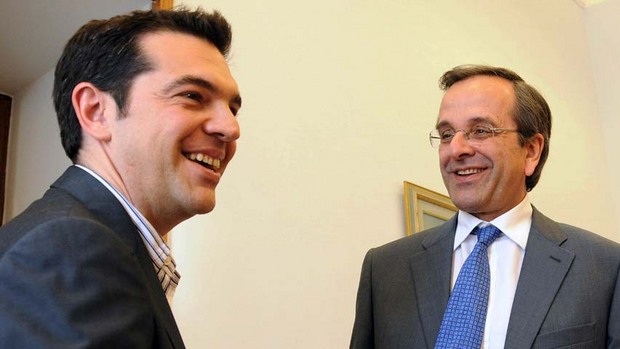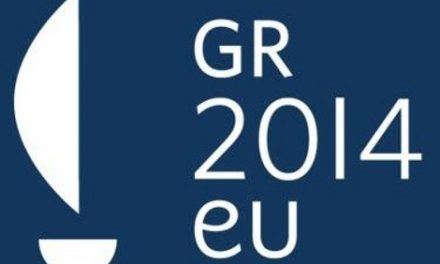Greece’s two main election rivals clashed over the country’s future economic direction as they wound up their respective campaigns for a vote Sunday that promises to reverberate across Europe.
Prime Minister Antonis Samaras, struggling to pull his New Democracy back into the running less than 48 hours before voting begins, and Alexis Tsipras of the Coalition of the Radical Left, known as Syriza, used their closing rallies to claim they were best placed to deliver Greece from unemployment and crushing debt and free it from an international aid program.
“Greece is exiting the bailout and will not need more loans,” Samaras said in a speech in central Athens on Friday evening. “The Tsipras accident will not happen.” The Syriza leader, speaking in the city of Heraklion, on the island of Crete, said his party “is the sole force of stability.” Only Syriza can “relieve the country from bailouts and the troika and negotiate its debt.”
Europe is watching Greece as voters prepare to cast their ballots in a snap election that has raised the specter of a fresh wave of crisis centered on the country that sparked the euro-area debt turmoil in 2010. Bonds and stocks rallied in Athens on Friday, suggesting investor concerns at the election outcome may be easing.
The Athens Stock Exchange rose 6.1 percent, erasing this year’s losses that had reached 4.2 percent through Jan. 22 on concern that the vote will endanger Greece’s 240 billion-euro ($270 billion) bailout. The yield on Greece’s benchmark 10-year bonds dropped 56 basis points to 8.41 percent.
Historic Election
Syriza’s platform includes negotiating a writedown on Greek debt from the so-called troika of official creditors, prompting Samaras to warn throughout the campaign that victory for Tspiras would risk Greece’s exit from the 19-nation euro area. Both leaders repeatedly stressed the “historical importance” of the election in the last week of the campaign.
Tsipras’s party, which held a slim poll lead throughout the monthlong campaign, extended its advantage on the eve of the election. Polls still suggest Syriza is unlikely to gather enough support to secure an outright majority in the 300-seat parliamentary chamber.
A GPO poll for Mega TV released late Friday in Athens put support for Syriza at 33.4 percent compared with 26.7 percent for New Democracy. The nationalist Golden Dawn placed third with 5.1 percent, followed by Samaras’s junior coalition partner, Pasok, and To Potami, or The River, tied with 5 percent backing each. GPO polled 2,000 people between Jan. 20 and Jan. 23. No margin of error was given.
‘Strategic Choice’
“The latest polls continue to suggest a victory from Syriza but that it will most likely have to seek coalition partners,” Barclays analysts Francois Cabau and Huw Worthington wrote in a note to clients Friday. “To Potami could be a relevant strategic choice.”
That raises the prospect of potential compromises in Syriza’s platform. To Potami’s leader has said the party won’t contemplate supporting any policy that threatens Greece’s euro membership.
An extension to the Greek bailout program expires at the end of February and with the country set to run out of cash by the end of June, the new government will have limited time to complete negotiations with its creditors.
“The people will have to choose whoever they want freely,” European Union Economic Commissioner Pierre Moscovici said in a Bloomberg Television interview in the Swiss resort of Davos Friday. “I’m quite confident that the euro zone now is capable of addressing any kind of political situation and any kind of economic situation,” he said. “I feel no risk and no will for a Grexit.”
Greek voting begins at 7 a.m. and ends at 7 p.m. Sunday, after which exit polls will be released. Initial projections of the result will be announced about 9:30 p.m. Athens time.



















